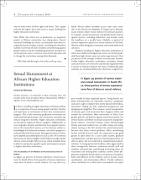| dc.contributor.author | Dranzoa, Christine | |
| dc.date.accessioned | 2018-10-22T08:44:54Z | |
| dc.date.available | 2018-10-22T08:44:54Z | |
| dc.date.issued | 2018 | |
| dc.identifier.citation | Dranzoa, C. (2018). Sexual harassment at African higher education institutions. International Higher Education, 94, 4–5. Retrieved from https://ejournals.bc.edu/ojs/index.php/ihe/article/download/10553/9072 | en_US |
| dc.identifier.issn | eISSN: 2372-4501 | |
| dc.identifier.uri | http://dir.muni.ac.ug/xmlui/handle/20.500.12260/246 | |
| dc.description.abstract | In Africa, enrolling in higher education institutions (HEIs) is an aspiration of many young people and their families and represents an investment in their own socioeconomic progress. This is why university graduation ceremonies are celebrated with great pomp—the ceremonies anticipate significant long-term benefits. Higher education institutions are the power engine of Africa’s progress. Additionally, issues of gender equality and diversity have gained momentum in the twenty-first century as it has become widely acknowledged that balanced economic and social progress is only possible with these tenets. Most governments in Africa have adopted and ratified policies such as the UN Universal Declaration of Human Rights and Freedoms (1948) and the African Union Gender Policy (2009), which mandate them to observe and practice gender equity and empower women in higher education institutions. | en_US |
| dc.language.iso | en | en_US |
| dc.publisher | International Higher Education | en_US |
| dc.relation.ispartofseries | 94; | |
| dc.subject | Sexual harassment | en_US |
| dc.subject | Higher education | en_US |
| dc.subject | Sexual violence | en_US |
| dc.subject | African institutions | en_US |
| dc.subject | Gender equity | en_US |
| dc.subject | Gender equality | en_US |
| dc.title | Sexual harassment at African higher education institutions | en_US |
| dc.type | Article | en_US |

